Contents
| |||||
| Decades: | |||||
|---|---|---|---|---|---|
| See also: | Other events of 1971 List of years in Syria | ||||
Events in the year 1971 in Syria .
| |||||
| Decades: | |||||
|---|---|---|---|---|---|
| See also: | Other events of 1971 List of years in Syria | ||||
Events in the year 1971 in Syria .
| Post | Name |
|---|---|
| President of Syria | Ahmad al-Khatib (until 12 March); Hafez al-Assad (starting 12 March) |
| Vice President of Syria | Mahmoud al-Ayyubi (starting 22 February) |
| Prime Minister of Syria | Hafez al-Assad (until 3 April); Abdul Rahman Khleifawi (starting 3 April) |
| Cabinet of Syria | Hafez al-Assad Government |

The United Arab Republic was a sovereign state in the Middle East from 1958 until 1961. It was initially a short-lived political union between Egypt and Syria from 1958 until Syria seceded from the union following the 1961 Syrian coup d'état. Egypt continued to be known officially as the United Arab Republic until it was formally dissolved by Anwar Sadat in September 1971.
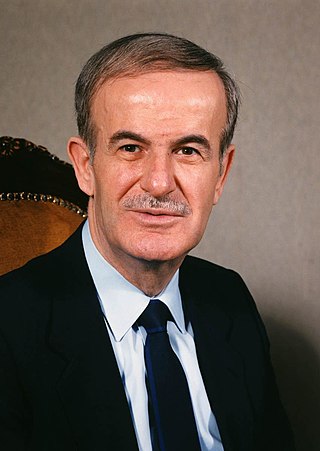
Hafez al-Assad was a Syrian politician and military officer who was the president of Syria from 1971 until his death in 2000. He was also the prime minister of Syria from 1970 to 1971 as well as the regional secretary of the regional command of the Syrian regional branch of the Arab Socialist Ba'ath Party and secretary general of the National Command of the Ba'ath Party from 1970 to 2000. Hafez al-Assad was a key participant in the 1963 Syrian coup d'état, which brought the Syrian regional branch of the Arab Socialist Ba'ath Party to power in the country, a power that lasted until the fall of the regime in 2024, then led by his son Bashar.
A one-party state, single-party state, one-party system or single-party system is a governance structure in which only a single political party controls the ruling system. In a one-party state, all opposition parties are either outlawed or enjoy limited and controlled participation in elections. The term "de facto one-party state" is sometimes used to describe a dominant-party system that, unlike a one-party state, allows multiparty elections, but the existing practices or balance of political power effectively prevent the opposition from winning power.

Bashar al-Assad is a Syrian politician, military officer, and former dictator who served as the president of Syria from 2000 until his government was overthrown in the Syrian Revolution in 2024. As president, Assad was commander-in-chief of the Syrian Arab Armed Forces and secretary-general of the Central Command of the Arab Socialist Ba'ath Party. He is the son of Hafez al-Assad, who ruled Syria from 1971 until his death in 2000.
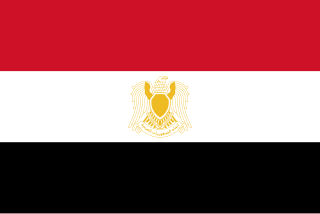
The Federation of Arab Republics was an unsuccessful attempt by Muammar Gaddafi to merge Libya, Egypt and Syria in order to create a unified Arab state. Although approved by a referendum in each country on 1 September 1971, the three countries disagreed on the specific terms of the merger. The federation lasted from 1 January 1972 to 19 November 1977.
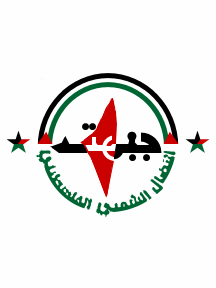
The Palestinian Popular Struggle Front is a Palestinian political party. Samir Ghawshah was elected secretary-general of PPSF in 1971 and led it until his death in 2009. He was succeeded by Ahmed Majdalani on 8 August 2009.

Following the fall of the Assad regime in December 2024, an Interim Legislative Council is expected to be formed in Syria. Previously the People's Assembly was the legislature of Syria during the Ba'athist period. It had 250 members elected for a four-year term in 15 multi-seat constituencies.

Syria, officially the Syrian Arab Republic, is a country in West Asia located in the Eastern Mediterranean and the Levant. It borders the Mediterranean Sea to the west, Turkey to the north, Iraq to the east and southeast, Jordan to the south, and Israel and Lebanon to the southwest. It is a republic under a transitional government and comprises 14 governorates. Damascus is the capital and largest city. With a population of 25 million across an area of 185,180 square kilometres (71,500 sq mi), it is the 57th-most populous and 87th-largest country.

Parliamentary elections were held in Syria on 7 May 2012 to elect the members of the Syrian People's Council. The elections followed the approval of a new constitution in a referendum on 26 February 2012.

The Corrective Movement, also referred to as the Corrective Revolution or the 1970 coup, was a bloodless military coup d'état led by General Hafez al-Assad on 13 November 1970 in Syria. Assad promised to sustain and improve the "nationalist socialist line" of the state and the Ba'ath Party. The Ba'ath party adopted an ideological revision, absolving itself of Salah Jadid's doctrine of exporting revolutions. The new doctrine placed emphasis on defeating Israel, by developing the Syrian military with the support of the Soviet Union.
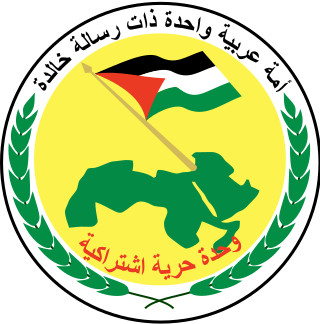
The Arab Socialist Ba'ath Party, also referred to as the pro-Syrian Ba'ath movement, is a neo-Ba'athist political party with branches across the Arab world. From 1970 until 2000, the party was led by the Syrian president and Secretary General Hafez al-Assad. Until 26 October 2018, leadership was shared between his son Bashar al-Assad and Abdullah al-Ahmar.
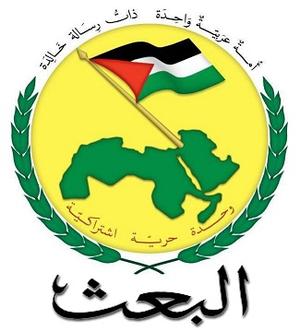
The Arab Socialist Ba'ath Party – Lebanon Region, commonly known as the Arab Socialist Ba'ath Party in Lebanon and officially the Lebanon Regional Branch, is a political party in Lebanon. It is the regional branch of the Ba'ath Party. The leadership has been disputed since 2015; however, Fayez Shukr was the party leader from 2006 to 2015, when he succeeded Sayf al-Din Ghazi, who succeeded Assem Qanso.
Local elections were held across Syria on 12 December 2011 to elect 17,629 councillors in 1,355 administrative units. Some 42,000 candidates contested the elections. The election took place on the second day of an opposition called general strike, with the Arab and Kurdish opposition boycotting the election. The Syrian government claimed the elections were a success and enjoyed a high turnout, however turnout in many parts of the country was seen as low.

Presidential elections were held in Syria on 3 June 2014. This was the first direct presidential election in Syria since the 1953 presidential election and the first multi-candidate election. The result was a landslide victory for Bashar al-Assad, who received over 90% of the valid votes. He was sworn in for a third seven-year term on 16 July in the presidential palace in Damascus. There is scholarly consensus that the elections were not democratic.

The first local elections in the Democratic Federation of Northern Syria were held on 22 September 2017. Representatives of 3,700 communes in the regions of the Northern Syria Federation were selected in the election, involving 12,421 candidates. The communal elections on 22 September were followed by elections of local councils in December and a federal parliamentary election of the People's Democratic Council, the region's highest governing body, in 2018. Some areas controlled by the Syrian Democratic Forces were not included in the election, including the city of Manbij.

The first Rojava regional elections were held on 1 December 2017. Local councils for the Jazira Region, Euphrates Region and Afrin Region were elected as well as for the subordinate cantons, areas and districts of the regions of Rojava. This followed the communal elections that were held on 22 September and was to be followed by a federal parliamentary election of the Syrian Democratic Council, the region's highest governing body, initially scheduled for January 2018, but was later postponed.

The First Syrian Republic, officially the Syrian Republic, was formed in 1930 as a component of the Mandate for Syria and the Lebanon, succeeding the State of Syria. A treaty of independence was made in 1936 to grant independence to Syria and end official French rule, but the French parliament refused to accept the treaty. From 1940 to 1941, the Syrian Republic was under the control of Vichy France, and after the Allied invasion in 1941 gradually went on the path towards independence. The proclamation of independence took place in 1944, but only in October 1945 was the Syrian Republic de jure recognized by the United Nations; it became a de facto sovereign state on 17 April 1946, with the withdrawal of French troops. It was succeeded by the Second Syrian Republic upon the adoption of a new constitution on 5 September 1950.
Local elections were held across Syria on 16 September 2018 to elect 18,478 local council members in 88 electoral districts. More than 40,000 to 41,000 candidates contested the elections according to pro-government sources. The elections were the first held since the 2011 Syrian local elections and took place amid the Syrian civil war. The elections only took place in territories under the control of the Syrian government, with special constituencies set up for areas outside of government control.

Parliamentary elections were scheduled to be held in Syria on 13 April 2020 to elect members of the People's Council of Syria. However, on 14 March they were postponed to 20 May due to the coronavirus pandemic. On 7 May it was decided to postpone the elections until 19 July. Syria's parliamentary elections occur every four years, with the last held in 2016.

Presidential elections were held in Syria on 26 May 2021, with expatriates able to vote in some embassies abroad on 20 May. This was the last presidential election to be held in Ba'athist Syria, prior to its overthrow following the 2024 Syrian opposition offensive.